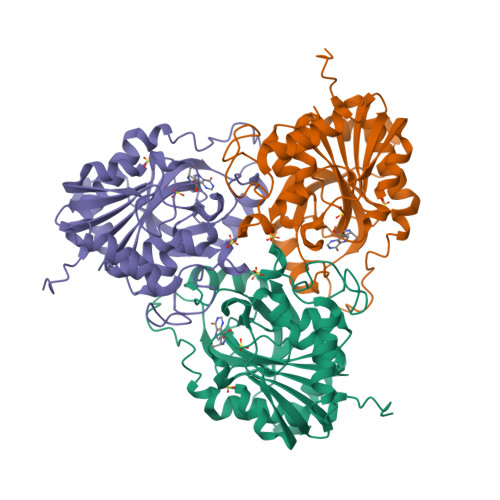purine nucleoside phosphorylase
Target not currently curated in GtoImmuPdb
Target id: 2841
Nomenclature: purine nucleoside phosphorylase
Abbreviated Name: PNP
Family: Nucleoside synthesis and metabolism, 2.4.2.1 Purine-nucleoside phosphorylase
Contents:
Gene and Protein Information  |
||||||
| Species | TM | AA | Chromosomal Location | Gene Symbol | Gene Name | Reference |
| Human | - | 289 | 14q11.2 | PNP | purine nucleoside phosphorylase | |
| Mouse | - | 289 | 14 26.31 cM | Pnp | purine-nucleoside phosphorylase | |
| Rat | - | 289 | 15p14 | Pnp | purine nucleoside phosphorylase | |
| Gene and Protein Information Comments | ||||||
| The Antimalarial targets family provides information about P. falciparum PNP. | ||||||
Previous and Unofficial Names  |
| NP | nucleoside phosphorylase | PUNP |
Database Links  |
|
| Alphafold | P00491 (Hs), P23492 (Mm), P85973 (Rn) |
| BRENDA | 1.4.2.1 |
| ChEMBL Target | CHEMBL4338 (Hs), CHEMBL2215 (Mm), CHEMBL2395 (Rn) |
| DrugBank Target | P00491 (Hs) |
| Ensembl Gene | ENSG00000198805 (Hs), ENSMUSG00000115338 (Mm), ENSRNOG00000009982 (Rn) |
| Entrez Gene | 4860 (Hs), 18950 (Mm), 290029 (Rn) |
| Human Protein Atlas | ENSG00000198805 (Hs) |
| KEGG Enzyme | 1.4.2.1 |
| KEGG Gene | hsa:4860 (Hs), mmu:18950 (Mm), rno:290029 (Rn) |
| OMIM | 164050 (Hs) |
| Pharos | P00491 (Hs) |
| RefSeq Nucleotide | NM_000270 (Hs), NP_038660 (Mm), NM_013632 (Mm), NM_001106031 (Rn) |
| RefSeq Protein | NP_000261 (Hs), NP_001099501 (Rn) |
| SynPHARM | 81910 (in complex with forodesine) |
| UniProtKB | P00491 (Hs), P23492 (Mm), P85973 (Rn) |
| Wikipedia | PNP (Hs) |
Selected 3D Structures  |
|||||||||||||

|
|
||||||||||||
Enzyme Reaction  |
||||||||||
|
||||||||||
Download all structure-activity data for this target as a CSV file 
| Inhibitors | |||||||||||||||||||||||||||||||||||||||||||||||||||
| Key to terms and symbols | View all chemical structures | Click column headers to sort | |||||||||||||||||||||||||||||||||||||||||||||||||
|
|||||||||||||||||||||||||||||||||||||||||||||||||||
| Immuno Process Associations | ||
|
||
|
||
|
||
|
||
|
||
|
||
|
||
|
Clinically-Relevant Mutations and Pathophysiology 
|
||||||||||||
|
||||||||||||
| General Comments |
| PNP is required for the recycling of nucleosides and deoxynucleosides. In humans, PNP is the only route for degradation of deoxyguanosine. T cells are sensitive to deficiencies of this enzyme, and genetic deficiency of PNP causes loss of T cell function from birth and leads to significant immunodeficiency [3]. |
References
1. Filgueira de Azevedo Jr W, Canduri F, Marangoni dos Santos D, Pereira JH, Dias MV, Silva RG, Mendes MA, Basso LA, Palma MS, Santos DS. (2003) Structural basis for inhibition of human PNP by immucillin-H. Biochem Biophys Res Commun, 309 (4): 917-22. [PMID:13679061]
2. Miles RW, Tyler PC, Furneaux RH, Bagdassarian CK, Schramm VL. (1998) One-third-the-sites transition-state inhibitors for purine nucleoside phosphorylase. Biochemistry, 37 (24): 8615-21. [PMID:9628722]
3. Stoop JW, Zegers BJ, Hendrickx GF, van Heukelom LH, Staal GE, de Bree PK, Wadman SK, Ballieux RE. (1977) Purine nucleoside phosphorylase deficiency associated with selective cellular immunodeficiency. N Engl J Med, 296 (12): 651-5. [PMID:402573]
How to cite this page
2.4.2.1 Purine-nucleoside phosphorylase: purine nucleoside phosphorylase. Last modified on 15/04/2019. Accessed on 26/04/2024. IUPHAR/BPS Guide to PHARMACOLOGY, https://www.guidetoimmunopharmacology.org/GRAC/ObjectDisplayForward?objectId=2841.










